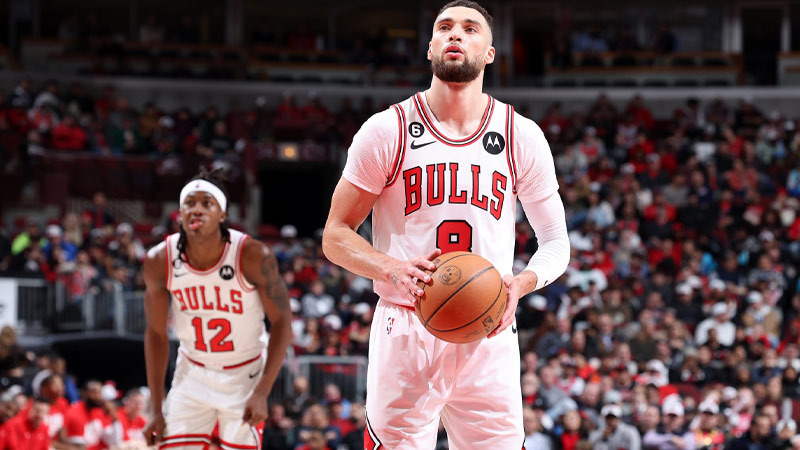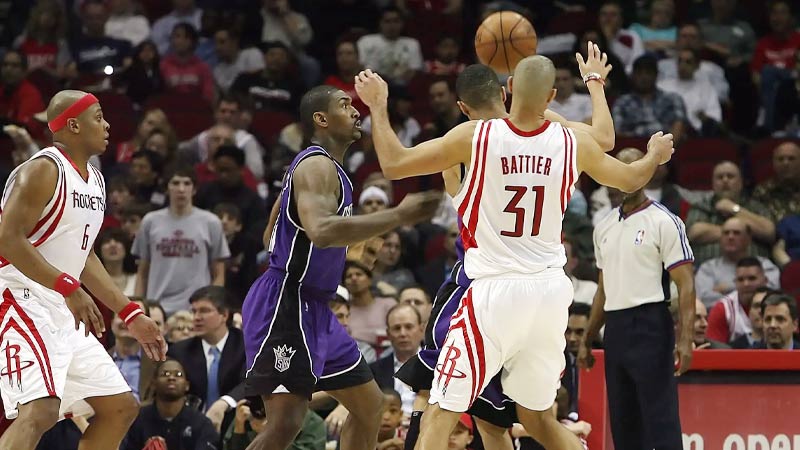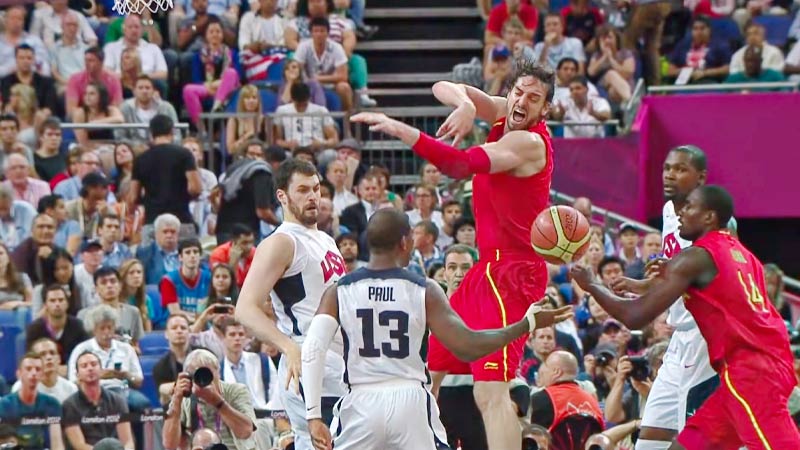Basketball often hailed as a sport dominated by star players, is also a realm where the unsung heroes play a pivotal role. These players, known as “role players,” might not always grace the headlines or be the face of the franchise, but their contributions are indispensable to the success of their teams.
In this blog post, we delve into the fascinating world of role players in basketball. From understanding their significance to exploring the qualities that define them, we shed light on why they are the glue that holds a team together.
So, let’s lace up our sneakers and embark on a journey to discover the often-overlooked gems of the hardwood.
Who Is a Role Player in Basketball?

Source: nba.com
In basketball, a role player refers to a player who fulfills a specific role or performs certain tasks within a team’s game plan, typically without being the team’s primary star or scoring leader.
Role players are essential to a team’s success because they provide support, and balance, and complement the skills of the star players. They are often valued for their defensive abilities, hustle, teamwork, and consistency in executing their assigned roles on the court.
Some common types of role players in basketball include:
Defensive Specialists
Players are known for their exceptional defensive skills, such as shot-blocking, steals, or on-ball defense. They are often tasked with guarding the opponent’s best scorer.
Three-Point Shooters
Players who excel at shooting from beyond the three-point line. They stretch the defense and create spacing for the star players.
Rebounders
Players with a knack for grabbing rebounds, both on the offensive and defensive ends of the court, providing second-chance opportunities or limiting the opponent’s chances.
Playmakers
These players are not the primary point guard, but they have good passing and court vision skills, helping in ball movement and creating opportunities for teammates.
Energy Players
Known for their hustle, determination, and high motor, they bring a burst of energy to the team and often contribute off the bench.
Defensive Stopper
A player who specializes in shutting down a specific opponent and limiting their impact on the game.
Sixth Man
Often the first player off the bench, the sixth man provides a scoring boost and stability to the team when the starters take a break.
Role-playing Bigs
Post players who may not be dominant scorers but excel at setting screens, defending the rim, and facilitating the offense.
Role players are essential in basketball because they help create a balanced and well-rounded team, allowing the star players to shine and enhancing the team’s chances of success in various situations.
Successful teams often have a combination of star players and effective role players working together to achieve their goals.
Criteria of a Good Role Player in Basketball

The criteria for a good role player in basketball are centered around their ability to effectively fulfill their assigned role and positively impact the team’s performance. Here are some key criteria that define a good role player:
Understanding of Role
A good role player fully understands their specific role within the team’s system. They know their strengths and weaknesses and focus on contributing in areas where they excel, whether it’s defense, three-point shooting, rebounding, or playmaking.
Team-first Mentality
A good role player prioritizes the team’s success over individual statistics or glory. They are willing to make sacrifices for the greater good of the team, such as setting screens, making the extra pass, or diving for loose balls.
Consistency
Reliable performance is crucial for a role player. Coaches and teammates should know what to expect from their game after game. Consistency in execution and effort can have a significant impact on the team’s overall performance.
Defense and Effort
Role players are often relied upon to play strong defense and provide energy on that end of the court. Good role players take pride in their defensive abilities, as this aspect of the game can be a game-changer in tight contests.
Specialized Skills
Each role player usually brings a specific skill set to the team. Whether it’s exceptional three-point shooting, shot-blocking, or being an excellent pick-and-roll player, a good role player excels in their specialized area.
Adaptability
While role players have specific responsibilities, they should also be adaptable and able to adjust their game to different situations. This includes being effective against different opponents or adapting to various offensive and defensive strategies.
Basketball IQ
Understanding the game and being able to make intelligent decisions on the court is vital for a role player. This includes reading the defense, making smart passes, and knowing when to take advantage of scoring opportunities.
Chemistry and Communication
Good role-players work well with their teammates and communicate effectively on the court. This helps improve team cohesion and ensures that everyone is on the same page during games.
Mental Toughness
Basketball can be a challenging and physically demanding sport. A good role player exhibits mental toughness, staying focused and resilient even in high-pressure situations.
Positive Attitude
A good role player brings a positive attitude to the team environment. They support their teammates, accept coaching feedback, and remain motivated even when facing adversity.
A good role player is a valuable asset to any basketball team because they complement the star players, provide balance, and contribute to the team’s overall success with their specialized skills and selfless approach to the game.
The Origin of the “Role Player” in the NBA
The concept of a “role player” in the NBA has been around for a long time and has evolved over the history of the league. While the specific term “role player” might not have been commonly used in the early days of the NBA, the concept of players fulfilling specific roles within a team has always been present.
In the early years of basketball, teams often had a clear distinction between their star players and the supporting cast.
The star players were the ones who carried the bulk of the scoring load and were the center of attention, while other players were expected to play more specialized roles, such as defensive specialists, rebounders, or facilitators.
As the NBA evolved and team strategies became more sophisticated, the importance of role players became more apparent. During the 1980s, the NBA saw the rise of dominant individual players like Magic Johnson, Larry Bird, and Michael Jordan, who were the focal points of their respective teams.
What Is Glue Guys in the Context of Role Player?
In the context of basketball and role players, “glue guys” refer to players who have a unique ability to hold a team together and bring cohesion to the group.
They are often considered the unsung heroes of a team, as their impact might not always be fully reflected in traditional statistics, but their presence is highly valued by coaches and teammates.
Glue guys are typically known for several key characteristics and contributions:
Team Chemistry
Glue guys are excellent at fostering positive team chemistry. They are often praised for their leadership, communication skills, and ability to get along with teammates. Their positive attitude and work ethic set an example for others.
Versatility
Glue guys are adaptable and can fill multiple roles on the court. They might not be the team’s primary scorer or star player, but they contribute in various ways, such as rebounding, defending multiple positions, making smart passes, and hitting timely shots.
Hustle and Intangibles
Glue guys are known for their hustle and effort on the court. They dive for loose balls, fight for rebounds, and make those “hustle plays” that energize the team and the fans. Their impact often goes beyond the box score, as they bring intangible qualities that help a team succeed.
Defensive Presence
Glue guys often excel on the defensive end of the floor. They take pride in their defensive assignments, guard multiple positions, and make key stops when needed. Their defensive contributions are highly valued by coaches.
High Basketball IQ
Glue guys tend to have a deep understanding of the game. They make intelligent decisions on the court, read plays well, and are reliable decision-makers in critical moments.
Reliability
Coaches and teammates can trust glue guys to execute their roles consistently. They are often reliable in pressure situations and can be counted on to step up when the team needs them.
The term “glue guy” is used to describe players who bring a team together and contribute in various ways that might not always be quantifiable in traditional statistics.
They are the players who provide the intangibles and fill the gaps that make a team successful, often earning the respect and admiration of their teammates and coaches.
It’s worth noting that the term “glue guy” is not an official basketball term but rather a colloquial description used by basketball analysts, fans, and sports media to recognize and appreciate the impact of these valuable role players on a team’s chemistry and success.
FAQs
What is a role player in basketball?
A role player in basketball refers to a player who fulfills a specific role or performs certain tasks within a team’s game plan, typically without being the primary star or scoring leader.
They are valued for their specialized skills, defensive abilities, and consistency in executing their assigned roles on the court. Role players provide crucial support to star players, create balance within the team, and contribute to the overall success of the squad.
What are some common roles played by role players?
Role players in basketball can take on various specialized roles. Some common types include defensive specialists, three-point shooters, rebounders, playmakers, energy players, and sixth men.
Each role brings a unique set of skills and contributions to the team, enhancing the team’s overall performance in specific areas of the game.
Why are role players essential in basketball?
Role players play a critical role in basketball teams for several reasons. They bring balance and depth to the roster, allowing star players to focus on their strengths.
Additionally, they contribute in areas that might not be the primary focus of the star players, such as defense, hustle, and teamwork. Role players are often the glue that holds the team together, providing support and stability when the going gets tough.
How do coaches identify and develop role players?
Identifying potential role players requires a keen eye for the game’s nuances. Coaches look for players who excel in specific skills that align with the team’s needs.
Additionally, players with high basketball IQ, a team-first mentality, and a willingness to work hard are often sought after as potential role players. Development involves honing specialized skills, fostering team chemistry, and instilling a strong work ethic.
Who are some notable role players in NBA history?
Throughout NBA history, numerous role players have left a significant impact on their teams’ success. Players like Dennis Rodman, known for his rebounding and defensive prowess, played a vital role in championship teams.
Bruce Bowen’s tenacious defense and three-point shooting helped the San Antonio Spurs achieve multiple titles. Additionally, players like Andre Iguodala and Manu Ginobili showcased their versatility and clutch performances, earning recognition as essential role players.
Bottom Line
In the pulsating world of basketball, role players stand tall as the unsung heroes who epitomize selflessness, versatility, and a team-first mentality. These players may not bask in the limelight, but their contributions on the court are undeniable.
From their specialized skills to their defensive tenacity, they hold the key to unlocking a team’s full potential. As we celebrate the stars of the game, let us also raise our voices in appreciation for the role players who are the heartbeat of every championship-caliber team.
So, the next time you witness an electrifying play on the court, take a moment to recognize the impact of the unassuming role player, quietly but effectively making their mark on the game of basketball.







